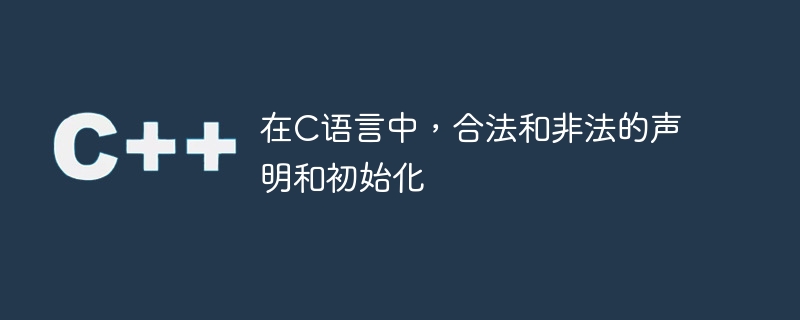Home >Backend Development >C++ >In C language, legal and illegal declarations and initialization
In C language, legal and illegal declarations and initialization
- 王林forward
- 2023-08-30 09:49:061586browse

Question
When doing C programming, mention some legal and illegal declarations and initializations?
Before discussing legal and illegal declarations and initialization, let's first look at how to declare and initialize variables in C.
Variable declaration
The following is the syntax for variable declaration -
Syntax
Datatype v1,v2,… vn;
where v1, v2,...vn are the names of variables.
For example, int sum;
float a,b;
Variables can be declared in two ways -
Local declaration
Global declaration
A "local declaration" is to declare a variable within the main block and its value is available within that block.
"Global declaration" is to declare a variable within the main block outside the main block, and its value is available throughout the program.
For example,
int a, b; /* global declaration*/
main ( ){
int c; /* local declaration*/
- - -
}Variable initialization
The following is the syntax for variable initialization-
Syntax
Datatype v1=number;
For example,
int sum=0; float a=1,b=4.5;
Use data types to declare variables, and we can initialize the value at declaration time. So, while initializing and declaring values, we need to follow the rules
Let us see some examples of legal and illegal declarations and initialization in C.
Example strong>
-
Char a=65;
This is a legal statement because we can initialize variables with constants .
-
Static int p=20, q=p*p
This is an illegal statement because static variables must be initialized with constants, but q is not initialized here
-
Double x=30 *PI
This is a legal statement because here we initialize a variable with a constant expression.
-
Double path[]={1,PI/2, PI, 2*PI/2}
This is a legal statement, here we initialize the array elements is a constant.
Sample program
With legal declaration and initialization−
Live demonstration p>
#include<stdio.h>
void main ( ){
int a,b;
a= 10, b = 20;
printf (" %d", a<b);
printf (" %d", a<=b);
printf (" %d", a>b);
printf (" %d", a>=b);
printf (" %d", a = =b);
printf (" %d", a ! =b);
}
Output
1 1 0 0 0 1
Example
Illegal declaration and initialization-
#include <stdio.h>
int main(){
static int p=20, q=p*p;//illegal initialization
printf("%d%d",p,q);
return 0;
}Output
error will be occurred error: initializer element is not constant static int p=20, q=p*p;
The above is the detailed content of In C language, legal and illegal declarations and initialization. For more information, please follow other related articles on the PHP Chinese website!

